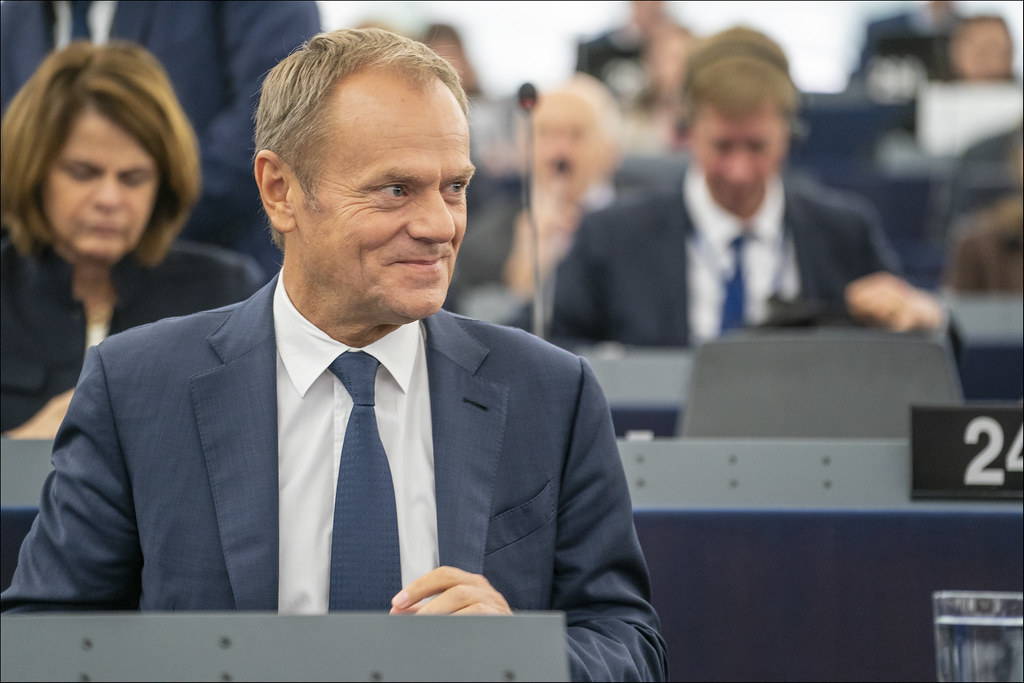Will Donald Tusk lead Poland again?

Exit polls say that the Pis (conservative) is the most voted party in Poland, but it is unlikely to be able to form a new government. Donald Tusk has a much better chance. Facts, numbers and insights
The polls seem to have become accurate in Poland too and the result of the exit polls (therefore still completely provisional) from yesterday's vote follows the forecasts of the last few days almost perfectly.
WHAT THE EXIT POLLS SAY ABOUT THE ELECTIONS IN POLAND
The Pis (Justice and Law), the national-conservative party in government, is confirmed in first place, but with 7 points less than in the previous elections it loses its absolute majority and will hardly be able to form a new government. The sum of the votes (and above all the seats) won by the three opposition parties allows for the formation of a majority, and this will be the challenge that Donald Tusk, the leader of the liberal-conservative coalition born from the expansion of the Civic Platform, will have to overcome ( Ko), placed second.
Five percentage points divide Pis from Ko: 36.8% the former with 200 seats, 31.6% the latter with 163 seats. But the other two parties that follow at a distance – the moderate liberals of the Third Way (13% and 55 seats) and the liberal-socialists of the New Left (8.6% and 30 seats) – have programmatic points in common with the Tusk formation and above all the same opponent in the crosshairs: Pis. The far right Konfederacja also enters the Sejm, the Polish parliament, with 6.2% and 12 seats expected.
HOW THE POLITICAL POLITICAL BALANCE WILL CHANGE
While waiting for the scrutiny to confirm the exit polls (the official results will not arrive before Tuesday morning, but four years ago the exit polls conducted by Ipsos were very close to the final data) we are discussing numbers that are provisional. From these, the party framework is much more simplified today compared to the years of fragmentation in parliament and therefore the calculations that the protagonists will have to do are rather simple. Pis pays for the rigidity of its positions and the underestimation towards an elastic political alliance, an element that will instead allow the returning Tusk to play the government game with many more cards in hand.
Jaroslaw Kaczynski himself, the master father of Pis, recognized this in his post-election speech to his supporters. The result obtained of almost 37% of the votes was a great success, he said speaking at the Pis headquarters, however the Pis may not be able to maintain power. “The question we ask ourselves is whether this success can be translated into another term of our government, and we don't know that yet,” he admitted, “but we must have hope and we must also know that whether we are in power or in opposition, we will implement our project in different ways."
The Pis will be the first to receive the mandate to form a new executive from the President of the Republic Andrzej Duda (of the same party) and will have thirty days to find the solution or change hands. But numbers in hand, even a possible alliance with the far right (which was excluded during the electoral campaign by both parties) would not lead to the necessary majority that requires 231 mandates.
THE DIFFICULT PATH OF TUSK
However, the path will not be easy for Tusk either. The three opposition parties, which together can count on around 284 seats, had indeed announced that they wanted to work after the vote on the possible formation of a government that would put an end to the Pis season, but then they had given up on forming a single list, preferring maintain different profiles and apply separately. The differences exist and will be emphasized during the negotiations: after all, forces that were once alternatives to each other will also have to unite, such as the left and the liberal conservatives of Po, even if the years of opposition to the Pis have cemented sensitivity common.
Tusk can return to center stage, after having governed Poland from 2007 to 2014 and having led one of the European institutions in the following years. Having returned to the national dimension, however, he was also the protagonist of a disappointing electoral campaign, in which slogans and personalisms prevailed which overshadowed serious discussions on the problems that the country will have to face in the coming years. And yet, despite not giving the impression of bringing anything new to the Polish political arena, Tusk managed more than anyone else to intercept that strong desire for change that came above all from the younger electorate and from the big cities. “I have never been so happy for a second place,” he told his cheering voters on election night, “Poland won, democracy won, it's the end of the Pis government.”
If the exit polls are confirmed today by the electoral count, Tusk will finally be able to emerge from the shadow of controversy and embody the new majority's desire for a change of direction.
The first analyzes on electoral movements (it must be reiterated, again based on exit polls) indicate a massive call from young voters to the polls. The drive for change lies there. It is the mobilization of young people in the cities that produced the highest voter participation ever (over 70% of those eligible) and the simultaneous rejection of the accompanying referendums (wanted by the Pis) which in fact would not have reached the quorum. Two signs that the exit polls should be broadly confirmed, perhaps with a few percentage points of correction, but nothing more.
This is a machine translation from Italian language of a post published on Start Magazine at the URL https://www.startmag.it/mondo/risultati-elezioni-polonia-donald-tusk/ on Mon, 16 Oct 2023 06:00:55 +0000.
